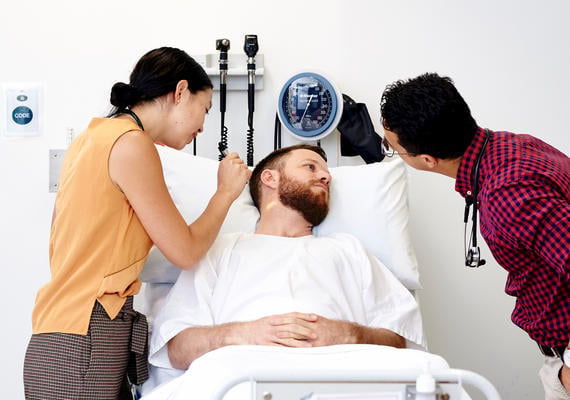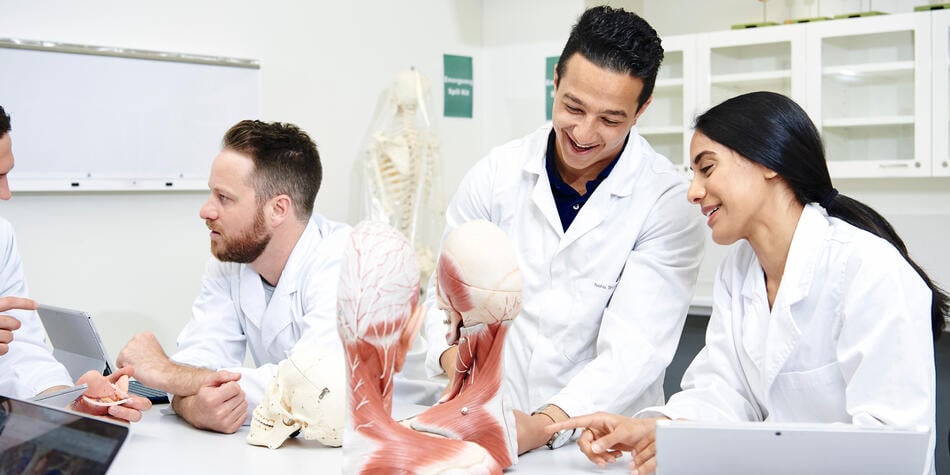About the clinic
The Rural Community Clinical School (RCCS) provides third year medical students with the opportunity to spend 12 months learning alongside rural generalists and specialists in regional Victoria. Fourth year is completed at one of the metropolitan, regional or rural clinical schools.
The RCCS is a Longitudinal Integrated Clerkship (LIC) – an innovative educational model where students learn under the guidance of an experienced rural clinical mentor. Clinical learning occurs across a range of rural health services, including general practices, hospitals, urgent care centres, specialist clinics, community and allied health. It is supported by a structured learning program, including parallel consulting, which allows students to be actively involved in patient assessment and clinical care.
RCCS placements allow students to follow patients over time through a range of healthcare settings, gaining a thorough understanding of the patient journey and the healthcare system. Active participation in patient care and the activities of the clinical team is encouraged, allowing students to get a hands-on experience, be able to actively contribute to the wellbeing of a smaller rural community and be well prepared for an internship.
The Rural Community Clinical School continues the long tradition of learning on the country of the Dja Dja Wurrung, Djab Wurrung, Wotjobaluk, Jaadwa, Jadawadjali, Jupagulk, Wergaia, Wadawurrung, Gulidjan, Djargurd Wurrung, Gunditjmara, Tjap Wurrung and Bunganditj people of the Kulin nations. We pay our respects to their elders past, present and emerging.
Key facts
- There are nine regional Victorian RCCS locations: Ararat, Bacchus Marsh/Melton, Camperdown, Colac, Daylesford, Hamilton, Horsham, Portland and Stawell.
- All sites have access to urgent care, primary care and specialised rural medicine, with the opportunity to follow the patient journey.
- Students are placed in groups of two to four at each site for learning.
- Face-to-face intensive teaching weeks take place every seven weeks.
Have an impact on community health
Study medicine at Deakin and graduate knowing you’ll be equipped with the skills and understanding to enhance health and wellbeing, wherever you practice.
Frequently asked questions
Can you choose where you complete your placement?
Once you have been allocated a place in the RCCS, you can then provide preferences for your preferred location. Placements will be determined based on the preferences of all students, however you cannot be guaranteed a particular location in the RCCS program.
Can you choose who you will be placed with?
You can preference other students you would like to be placed with, but placements will be determined based on the preferences of all students.
How often do students need to travel?
You will be required to attend in person for face-to-face teaching programs once every seven weeks. These currently occur at Warrnambool, Ballarat and Geelong. Accommodation is provided.
There may also be some requirement for local travel within your region for particular learning experiences. You will be reimbursed for necessary travel at standard University student rates per kilometre. You'll receive a vehicle logbook to keep a record of all your RCCS-related travel.
What does a typical week look like?
A typical week as a RCCS student includes weekly parallel consulting sessions in your GP practice, as well as weekly online interactive tutorials and case discussions. You'll also experience local bedside tutorials, clinical teaching sessions and specialist consulting sessions. You'll also see a variety of patients in urgent care and participate in ward rounds.
Is the curriculum and assessment the same as other clinical schools?

Studying at the RCCS
Hear from students and teachers what it's like to study at Deakin's RCCS during your third year. Learn more about the innovative educational model – Longitudinal Integrated Clerkship (LIC), that helps students develop their clinical skills while immersing themselves in rural communities across Victoria.
RCCS is a great opportunity to experience the reality of rural medicine in Australia. We have the ability to see patients in the community, as well as in an inpatient setting, allowing us to have a greater understanding of all episodes of care. Living in the community has also been a rewarding and enjoyable experience.
Greg Howe
2021 Rural Community Clinical School student
Interested in studying a Doctor of Medicine?
Want a medicine degree that enables you to enhance community health and wellbeing? Deakin’s Doctor of Medicine takes you beyond the classroom to work with patients and their families across western Victoria. You’ll learn how medicine is practised in rural areas, while building valuable relationships with communities that will really value and welcome you once you graduate.
Contact us
Have a question or need more information about Rural Community Clinical School? Please connect with our team.
Director
Associate Professor Lara Fuller
+61 3 5247 9140
Email Lara Fuller
Administrative officer
Colleen Stephens
+61 3 5227 2499
Email Colleen Stephens

